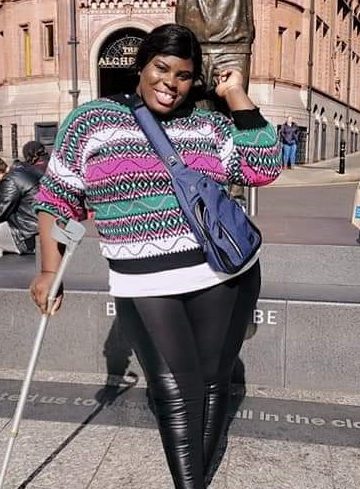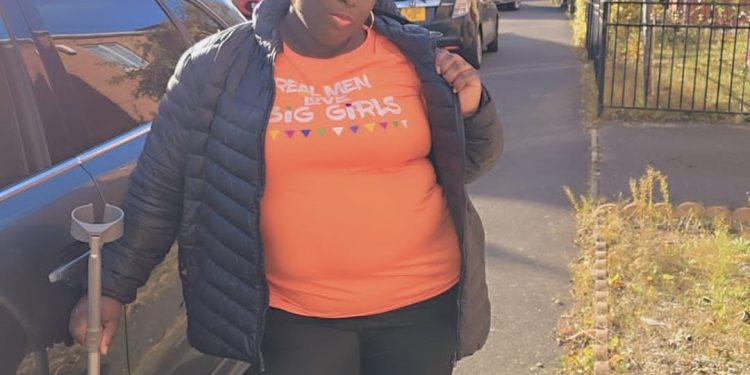The 21st of the Disability Champions Series narratives is here. Our guest, Folajogun (Fola) Victoria Akinlami (physically challenged from polio) is the founder of Differently Abled Foundations – an NGO providing emotional and physical support for children and teenagers with disabilities.
Fola is a Mandela Washington Fellow. She lives in the United Kingdom and works with the second-largest energy firm in the country. This year she was honored with the prestigious Global Recognition Award for Advocacy and Social Impact. She has made significant contributions to social change and advocacy for marginalized communities – especially children living with disabilities.
It was a long coming (amidst her very tight schedule), however I was able to get this amazing woman to feature in the series. As we chat over the phone, Fola shares compelling narratives of her disability experience – the conquest of tough love and a rugged daring to dream and pursue her dreams despite distractions she calls ‘ariwo oja’ market noise.
Growing up under tough love.
It was a blessing in disguise. Fola had the luck of a family that never allowed her to use disability as an alibi for entitlement. She was taught to be rugged. She recounts that tough start with steeled emotions:
“I am the first of three children from a polygamous family. We are three girls from my mum. I grew up in a Ondo town, Akure, Ondo State. I lost my Dad at the age of seven and since then it was just my mom and she’s a superhero.
My mother made sure I did everything, and more, as the firstborn – no special treatment. She would hurry me on errands the same way she hurried my sisters, and was quick to spank when the need arose. Her favourite lines for administering the stick were: “Ese loun dun e, ori o dun e, kilode toun se bi didirin? Se ori dun e ni? Translated as “you are only physically challenged not intellectually disabled, why are you acting like an intellectually disabled child? Are you an imbecile?”.
“I get those [spankings] on speed dial”, she concludes with her trademark humor.
I didn’t have to adapt to my disability and disability doesn’t affect disabled people alone
“I walk with a serious limp, that’s my disability. I have been physically challenged for the better part of my life… [it] is the only life I have ever known”.
She was just a year old when polio struck. One wrongly administered injection from a nurse and her right leg was permanently affected. Given such an early occurrence, Fola says that’s the only life she has ever known so there was nothing like adapting. She shares more insights on her experience.
“To me, I didn’t have to [adapt to my disability], as that’s the only way I have known so I didn’t have to master it. Disability doesn’t affect disabled people alone and as such what you can do is not to celebrate the disabled person alone, you should also interview [acknowledge the roles played by] their siblings and friends.
To prove this, she recalls an enduring memory.
I remember visiting my uncle who was a navy captain at the time. My sister and I were going somewhere. As usual, I couldn’t keep up with her pace and my sister would often wait for me to catch up.
That morning I was shocked when my uncle screamed at her to keep going. Then he walked up to me and said:
“Fola, we all have our pace in life, the fact that she gets there before you doesn’t mean you won’t get there too. We all have to arrive at our own time, no one… has to wait for you. I hated [my uncle] that morning,” Fola concludes. But [in hindsight] she admits that [those] words never left her. She remains grateful for that encounter.
Denial – the down side of tough love
Yet, the kind of hard love Fola experienced does come with its negative impact – most times subtle, delusional. Fola recalls the denial that tough love foisted:
“The effect this tough love had on me was that I didn’t see myself as physically challenged. I would not want to be in the same room as another challenged person. I was a presenter on TV and refused to take up any disability-related program because [in my escapist thinking] I am not one of them”
Fortunately, she got a new perspective when she visited South Africa.
Fola was impressed by the love and respect she received in Madiba’s country. She got a distinct kind of preferential treatment based on respect rather than pity. That experience opened her eyes to what she called “the thin line between respect and pity”.
I am one of them – Coming into acceptance
Eventually, Fola embraced reality: “I first acknowledged that I am with them and one of them [but] I also realized that I didn’t want the pity”.
“I hated the sense of entitlement that [many] challenged people had. The ‘pity party’ they want to throw themselves. I decided to do something about it in my own little way – to give to the needy who really can’t help themselves”.
But beyond helping, Fola saw the need to show [people with disabilities] how to make an impact. This led to the idea for ‘Beyond Challenges’ a program conceived to inspire people with disabilities to reach their peak by showcasing stories of people from across the globe, who have risen beyond the challenges of disability to succeed in their chosen fields.
Education/Career
Fola’s primary schooling took off at Alagbaka Primary School, Akure. From there she went to St Loius Grammar School, Akure. Then she gained admission into the famed Obafemi Awolowo University, Ile-Ife. After graduating from university, she did a service stint with the Osun State Radio Corporation (OSRC) where her dad had earlier worked as a broadcaster.
She wanted to be a broadcaster too. Starting off as a freelancer in 2006, she worked up the civil service ladder till 2022. Along the way, Fola’s humanitarian work through her organization, The Differently Abled Foundation earned a Mandela Washington Fellowship (MWF) at the University of Wisconsin Madison. There she bagged a leadership certificate in project management. The MWF experience was an eye-opener and Fola pushed for more opportunities. She went on to secure a spot at Nottingham Trent University in the United Kingdom for her Master’s in Youth Work and Leadership Practice.
“So that’s it, Fola concludes with confidence, I have my Master’s and I am hoping for a PhD”.
Discrimination – Of stereotypes and myths
Fola’s perspective on society’s discrimination against persons with disabilities is interesting. She sees discrimination as “Ariwo oja” [translated distraction or market noise]. She says that this distraction is something one should look beyond in order to focus on more important goals. She should know, having had more than her fair share of the market noise yet rose beyond it to focus on the price required to reach the prize she set herself. Her implied message is unmistakable:
Don’t let societal barriers [and they are as subtle as they get] block your vision. Rise above and shine
An audacious daring
“The first time I experienced discrimination was when my secondary school friend left the field after cutting grass and, going to my locker, picked my school cap and [wiped her feet] with it. Unfortunately for her I happened to walk into the classroom at that moment. In one fit of blind anger, I [aimed at her] with the cutlass in my hand. Luckily, she dodged. The whole class kept quiet but they also realized that I could throw faster than they could run. From then on, respect became mutual.”
The market noise around love
During the interview, Fola points to myopic views about disability [most in connection to her love life] as a reason why she considers societal stereotypes and myths around disabilities among her biggest challenges in life.
She recalls a few hurtful incidences:
“My supposed mother-in-law objected to my 3-year-long relationship [with her son] saying I would embarrass her during the wedding ceremony, especially [in the presence of] their rich and classy friends! She threatened to curse her son if he continued [in] the relationship. That heartbreaking incident drove her into advocacy and the penning of a love song titled ‘ariwo oja’.
Curing myopia is one thing but battling systemic myopia and injustice is another kettle of fish.
Her first lover jilted her when someone asked him what her kids would look like as a disabled [lady]. There was a daft question about how/if she could carry a pregnancy. And when she eventually got pregnant and was delivered of a baby girl, stereotypes had doubts that she carried the pregnancy herself!
Fola got a rude shock when, after putting to bed she was refused maternity because she didn’t have a marriage certificate. She asks with indignation: “Do married women not put to bed the same [way] as their unmarried counterparts? Is this honeymoon or maternity leave?

Death wish – driving the highway with a bad leg
Yet amid the hurts, one can still catch on humor. So I asked Fola if she remembered any hilarious incident in connection with her disability and she had it ready:
“These guys are wondering if you have a death wish”
“One day my sister and I were driving to her office. As we approached the [police checkpoint] on [her regular route] and she said: “Fola, please let me park so you can drive this highway, I am not in the mood for them [officers on duty] today”. We parked, and as I came down to take over the wheels the expression of the officers changed and you could see it. I told my sister: “these guys are wondering if you have a death wish because how do you explain giving your vehicle to someone with a bad leg as you approach the highway”?
“[Eventually] our hilarious laughter snapped those officers out of the narrowness their mind had them [trapped] in. We laughed till my sister dropped off”.
What you can’t change you live with it – and well too.
Fola closes the interview with the above advice to persons with disabilities. I asked her if she thinks disability is a bad thing. Her response, though a bit evasive, was philosophical – reflecting the deep-seated emotions of someone who knows how bad the shoe pinches yet dares beyond it:
“Hell no, Fola says, [disability] is not a good thing, but what you can’t change you have to live with it and you may as well live well with it!
The Disability Champions Series, a collaborative project with Madam Joy Bolarin, Executive Director, Jibore Foundation, is anchored by Ogheneruemu Alexander (Disability issues blogger).
Special acknowledgement to T.O.L.A Foundation for constant back up support.

